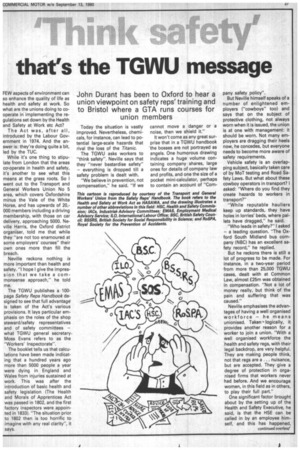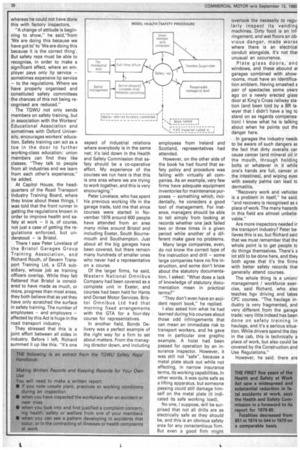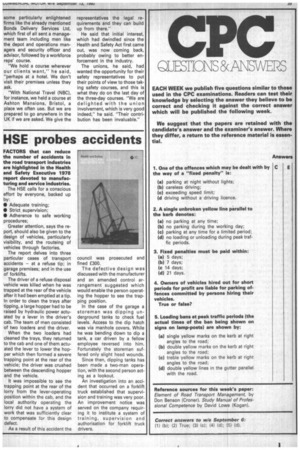that's the TGWU message
Page 39

Page 40

Page 41

If you've noticed an error in this article please click here to report it so we can fix it.
John Durant has been to Oxford to hear a union viewpoint on safety reps' training and to Bristol where a GTA runs courses for union members
FEW aspects of environment can so enhance the quality of life as health and safety at work. So what are the unions doing to cooperate in implementing the regulations set down by the Health and Safety at Work etc Act?
The Act was, after all, introduced by the Labour Government in 1974. And the answer is: they're doing quite a bit, led by the TUC.
While it's one thing to stipulate from London that the areas cooperate in health and safety, it's another to see what this means at the grass roots. So I went out to the Transport and General Workers Union No 5 area, which covers Oxfordshire minus the Vale of the White Horse, and has upwards of 20,000 members including a driving membership, with those on car delivery, approaching 5000. Neville Harris, the Oxford district organiser, told me that while they "are not too enamoured at some employers' courses" their own ones more than fill the breach.
Neville reckons nothing is more important than health and safety. "I hope I give the impression that we take a cornmonsense approach," he told me.
The TGWU publishes a 100page Safety Reps Handbook designed to see that full advantage is taken of the Act's various provisions. It lays particular emphasis on the roles of the shop steward/safety representatives and of safety committees — what TGWU general secretary, Moss Evans refers to as the "Workers' Inspectorate".
The booklet tells us that calculations have been made indicating that a hundred years ago more than 5000 people a year were dying in England and Wales from injuries sustained at work. This was after the introduction of basic health and safety legislation (The Health and Morals of Apprentices Act was passed in 1802, and the first factory inspectors were appointed in 1833). "The situation prior to 1802 then is too horrific to imagine with any real clarity", it says. Today the situation is vastly improved. Nevertheless, chemicals, for instance, can lead to potential large-scale hazards that rival the loss of the Titanic.
The TGWU asks workers to "think safety". Neville says that they "never bastardise safety" — everything is dropped till a safety problem is dealt with.
"We believe in prevention, not compensation," he said. "If we cannot move a danger or a noise, then we shield it."
It won't come as any great surprise that in a TGWU handbook the bosses are not portrayed as angels. One humorous drawing indicates a huge volume containing company shares, large ones for details of company law and profits, and one the size of a pocket mini-calculator, perhaps to contain an account of "Corn pany safety policy".
But Neville himself speaks of a number of enlightened employers ("cowboys" too) and says that on the subject of protective clothing, not always worn when it is issued, the union is at one with management: it should be worn. Not many employers are dragging their heels now, he concedes, but everyone needs to become more aware of safety requirements.
Vehicle safety is an overlapping subject, basically taken care of by MoT testing and Road Safety Laws. But what about these cowboy operators in transport? I asked: "Where do you find they create hazards to workers in transport?"
"While reputable hauliers keep up standards, they have holes in lorries' beds, where pallets have dragged," he said.
"Who leads in safety?" I asked — a leading question. "The Oxford South Midland bus company (NBC) has an excellent safety record," he replied.
But he reckons there is still a lot of progress to be made. For instance, in a two-year period from more than 25,000 TGWU cases, dealt with at Common Law, almost £25m was obtained in compensation. "Not a lot of money really, but think of the pain and suffering that was caused."
Neville emphasises the advantages of having a well organised workforce — he means unionised. Taken logically, it provides another reason for a worker to join a union. "With a well organised workforce the health and safety regs, with their legal backdrop, are very helpful. They are making people think, not that regs are a ... nuisance, but are accepted. They give a degree of protection in organised firms that workers never had before. And we encourage women, in this field as in others, to play their full part."
One significant factor brought about by the setting up of the Health and Safety Executive, he said, is that the HSE can be called in by an employee himself, and this has happened, whereas he could not have done this with factory inspectors.
"A change of attitude is beginning to show," he said,"from 'We are doing this because we have got to' to 'We are doing this because it is the correct thing'. But safety reps must be able to recognise, in order to make a significant effect, where an employer pays only lip service — sometimes expensive lip service — to the regulations. Where we have properly organised and constituted safety committees the chances of this not being recognised are reduced."
The TGWU not only sends members on safety training, but in association with the Workers' Educational Association and sometimes with Oxford University, encourages workers' education. Safety training can act as a toe in the door to further working-class education; union members can find they like classes. "They talk to people from all industries and we learn from each other's experience," he added.
At Capitol House, the headquarters of the Road Transport Industry Training Board, where they know about these things, I was told that the front runner in getting the regulations known in order to improve health and safety at work — it is, of course, not just a case of getting the regulations enforced, but understood — is Bristol.
There I saw Peter Lovelace of the Bristol Garages Group Training Association, and Richard Routh, of Severn Transport Training Ltd, a GTA subsidiary, whose job as training officers overlap. While they felt flattered that Bristol is considered to have made as much, or more, progress than most areas, they both believe that as yet they have only scratched the surface in safety training. The number of employees — and employers — affected by this Act is huge in the road transport industry.
They stressed that this is a joint effort between all sides in industry. Before I left, Richard summed it up like this: "It's one
aspect of industrial relations where everybody is in the same net; it's laid down in the Health and Safety Commission that safety should be a co-operative effort. My experience of the courses we run here is that this is one area where we are trying to work together, and this is very encouraging."
Peter Lovelace, who has spent his previous working life in the garage trade, told me that since courses were started in November 1978 around 600 people have attended from an area many miles around Bristol and including Exeter, South Bournemouth and Southampton. Just about all the big garages have been covered, but there remain many hundreds of smaller ones who never had a representative on a course.
Of the larger firms, he said, Western National Omnibus Company had been covered as a complete unit in Exeter, and courses had been held for Hants and Dorset Motor Services. Bristol Omnibus Ltd had that morning fixed arrangements with the GTA for a four-day course for representatives.
In another field, Bonds Delivery was a perfect example of the right way for a firm to set about matters. From the managing director down, and including employees from Ireland and Scotland, representatives had attended.
However, on the other side of the book he had found that safety policy and procedure was failing with virtually all companies. As an example, very few firms have adequate equipment inventories for maintenance purposes — something which, incidentally, he considers a good tool of management. For instance, managers should be able to tell simply from looking at records whether one jack failed two or three times in a given period while another of a different make gave no problems.
Many large companies, even, do not know the correct type of fire instruction and drill — some large companies have no fire instruction, and some don't know about the statutory documentation, I asked: "What does a lack of knowledge of statutory documentation mean in practical terms?"
"They don't even have an accident report book," he replied.
I also asked him what he had learned during his courses about those odd infringements that can mean an immediate risk to transport workers, and he gave me in particular one graphic example. A hoist had been passed for operation by an insurance inspector. However, it was still not "safe", because a metal plate stuck out while not affecting, in narrow insurance terms, its working capabilities. In other words, it was quite safe as a lifting apparatus, but someone passing could still damage himself on the metal plate (it indicated its safe working load).
No one, I suppose, will be surprised that not all drills are as electrically safe as they should be, and this is an obvious safety area for any conscientious firm. But even a good firm might overlook the necessity to regularly inspect its vending machines. Dirty food is an infringement, and wet floors an obvious danger, made worse where there is an electrical conduit alongside. It's not that unusual an occurrence.
Plate glass doors, and windows, and these abound at garages combined with showrooms, must have an identification emblem. Having smashed a pair of spectacles some years ago on a newly erected glass door at King's Cross railway station (and been told by a BR lawyer that I didn't have a leg to stand on as regards compensation) I know what he is talking about when he points out the danger here.
In garages the industry needs to be aware of such dangers as the fact that dirty overalls car cause cancer (and mineral oil ir the mouth, through holding bolts or whatever in it while one's hands are full, cancer ol the intestines), and wiping eyes with sweaty palms can lead to dermatitis.
"Recovery work and vehicles is a problem in itself," he said, "and recovery is recognised as a place of work. The many hazards in this field are almost unbelievable."
Are more inspectors needed in the transport industry? Peter believes this is so, but Richard said that we must remember that the whole point is to get people to do things themselves. There's a lot still to be done here, and they both agree that it's the firms with better safety records that generally attend courses.
The whole thing is a union/ management / workforce exercise, said Richard, who also teaches hgv driving and takes CPC courses. "The haulage industry is very fragmented, and very different from the garage trade; very little indeed has been done on safety training in haulage, and it's a serious situation. While drivers spend the day in the cab, this is technically a place of work, but also could be covered by the Construction and Use Regulations,"
However, he said there are
some particularly enlightened firms like the already mentioned Bonds Delivery Services Ltd, which first of all sent a management team including men like the depot and operations managers and security officer and advisor, followed by a workforce reps' course.
"We hold a course wherever our clients want," he said, "perhaps at a hotel. We don't visit their premises unless they ask.
"With National Travel (NBC), for instance, we held a course at Ashton Mansions, Bristol, a place we often use. But we are prepared to go anywhere in the UK if we are asked. We give the representatives the legal requirements and they can build up from there."
He said that initial interest, which had dwindled since the Health and Safety Act first came out, was now coming back, probably owing to better enforcement in the industry.
The unions, he said, had wanted the opportunity for their safety representatives to put their points of view to those taking safety courses, and this is what they do on the last day of the three-day courses. "We are delighted with the union involvement, which is very good indeed," he said. "Their contribution has been invaluable."












































































































